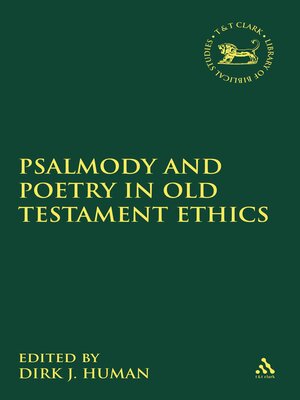Psalmody and Poetry in Old Testament Ethics
ebook ∣ The Library of Hebrew Bible/Old Testament Studies
By Dirk J. Human

Sign up to save your library
With an OverDrive account, you can save your favorite libraries for at-a-glance information about availability. Find out more about OverDrive accounts.
Find this title in Libby, the library reading app by OverDrive.



Search for a digital library with this title
Title found at these libraries:
| Library Name | Distance |
|---|---|
| Loading... |
Questions arise from scholarly debate in Hebrew Bible ethics such as: what is Old Testament ethics?, what is the object of study?, what are the methods involved and how normative are Old Testament ethics for modern contexts? These questions advance crucial issues in the quest for understanding ethics of the ancient Hebrew mind and the problem of how to contextualize them in modern contexts.
This book begins by exploring the relationship between the Old Testament and Ethics, as well as a philosophical discussion on meta-ethical presuppositions on divinity and morality in the Psalter. The main part of the book reflects analyses of specific psalms (Pss 16; 34; 50; 72; 104; and 133). The core of this section reflects an illustration of psalm texts with the thematic focus on Hebrew ethical thinking. Included are a few contextual contributions discussing relevant ethical issues in Africa from an African perspective. In the final section two exemplary poetic texts from the Pentateuch (Deut 32) and the Prophets (Jer 5) reverberate ethical thinking from other parts of the Hebrew canon.
This book begins by exploring the relationship between the Old Testament and Ethics, as well as a philosophical discussion on meta-ethical presuppositions on divinity and morality in the Psalter. The main part of the book reflects analyses of specific psalms (Pss 16; 34; 50; 72; 104; and 133). The core of this section reflects an illustration of psalm texts with the thematic focus on Hebrew ethical thinking. Included are a few contextual contributions discussing relevant ethical issues in Africa from an African perspective. In the final section two exemplary poetic texts from the Pentateuch (Deut 32) and the Prophets (Jer 5) reverberate ethical thinking from other parts of the Hebrew canon.







